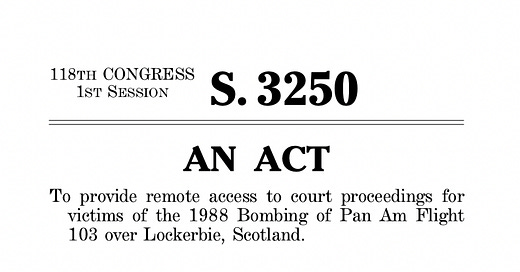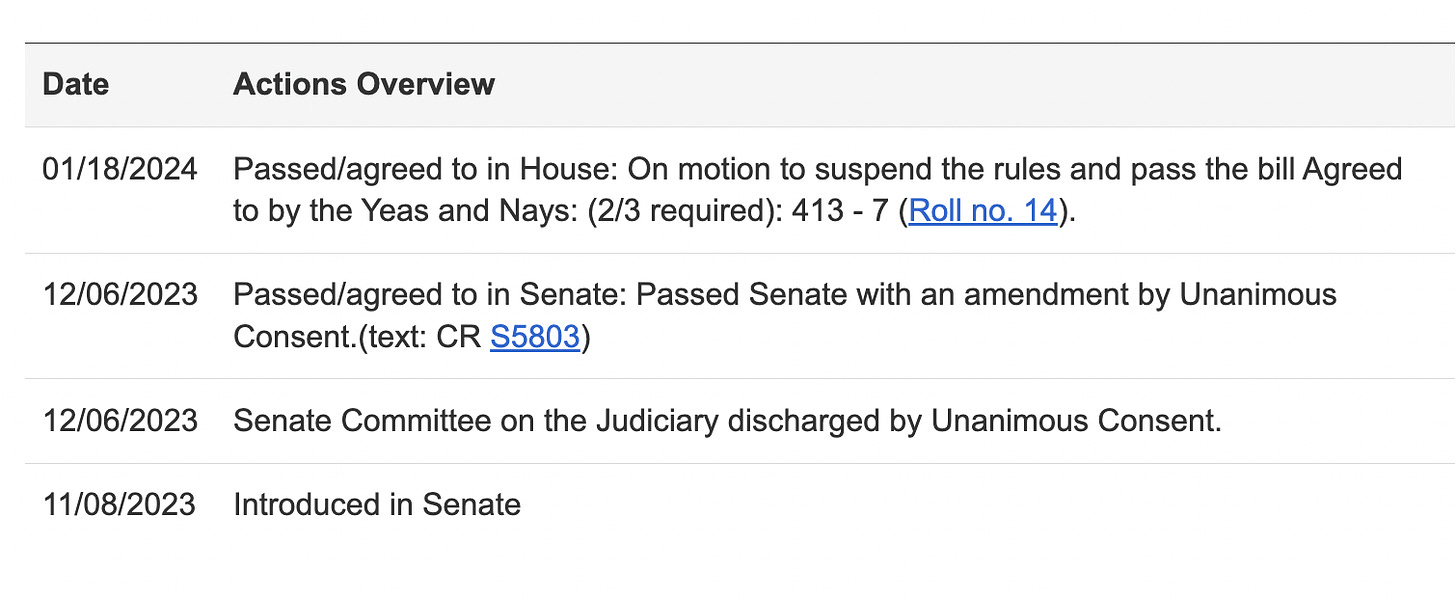There’s a lot of legal news brewing right now. All of it is important, and all of it matters. We will get to it over the next few days. But tonight, I want to switch gears and ask an important question about what Congress has the ability to do. If you like my idea, perhaps you’ll take advantage of the opportunity to ask/demand that your elected representatives on the Hill follow suit.
Here’s the deal: Senators John Cornyn, a Texas Republican, and Kirsten Gillibrand, a New York Democrat, cosponsored S. 3250, “An Act to provide remote access to court proceedings for victims of the 1988 Bombing of Pan Am Flight 103 over Lockerbie, Scotland.”
S. 3250 was introduced in the Senate on November 8, 2023, and it passed by unanimous consent on December 6, garnering little, if any, attention. Next, the bill moved to the House. Yesterday, it passed there. Now, all that’s left is for the Bill to go to President Biden’s desk for signature. Once that happens, the bill, as they say, will become a law.
Only seven members of the House voted against the bill. It cleared the House on an overwhelmingly bipartisan 413-7 vote (13 members weren’t present), almost unheard of these days. It took just over two months for S. 3250 to pass both chambers of Congress.
Here’s the key provision in the bill: “… notwithstanding any provision of the Federal Rules of Criminal Procedure or other law or rule to the contrary, in order to permit victims of crimes associated with the bombing of Pan Am Flight 103 to access court proceedings in the criminal case against Abu Agila Mohammed Mas’ud Kheir Al-Marimi and against any co-conspirator subsequently charged and prosecuted in a court of the United States for crimes related to the 1988 bombing of Pan Am Flight 103, the district court of the United States in such a case shall order that reasonable efforts be made to make remote video and telephonic access to proceedings in the case available to victims of crimes associated with the bombing of Pan Am Flight 103.”
The bill provides victims' family members access to court proceedings no matter where they are located.
Many of you will remember the tragic 1988 bombing of Pan Am Flight 103 over Lockerbie, Scotland, that took the lives of 270 people. The victims included 190 Americans and 43 citizens of the United Kingdom, some of whom were on the ground in Lockerbie. Citizens from Argentina, Belgium, Bolivia, Canada, France, Germany, Hungary, India, Ireland, Israel, Italy, Jamaica, Japan, Philippines, South Africa, Spain, Sweden, Switzerland, and Trinidad and Tobago perished in the blast.
In December 2020, DOJ made public charges against Abu Agila Mohammad Mas’ud Kheir Al-Marimi (Mas’ud) of Libya and Tunisia. Mas’ud was charged for his role in building the bomb used in the attack. An Interpol Red Notice was issued for him. The Red Notice requested assistance from all Interpol member countries in locating and arresting Mas’ud, so he could be sent to the United States to face charges.
Mas’ud was indicted by a grand jury in November of 2022, and on December 12, 2022, Attorney General Merrick Garland announced that he was in U.S. custody. Mas’ud pled not guilty in February of 2023. Trial is currently scheduled for May 2025, with pre-trial proceedings ongoing.
This new law will mean that affected people who are too old or infirm to travel to Washington, D.C., or those who are too far away to readily make the trip will still be able to observe court proceedings. Prosecutors at the Justice Department supported the move because they thought it was important for people affected by the crime to see justice in action.
Of course it is.
Apparently, it’s just that simple. Congress can do it if the courts won’t. They can do it in just a couple of months. And while DOJ objected to opening up access to the January 6 case against Donald Trump when news organizations made the request, that doesn’t seem to be an institutional policy that has to apply in all cases. Access to court proceedings is fitting for a serious and important criminal proceeding like the one Donald Trump is charged in. And the same sort of law must be adopted so all Americans can have access to proceedings in the prosecution of Donald Trump.
Like the Lockerbie bombing case, Trump’s prosecution for interference in the 2020 election is of singular importance. Many of the victims—for every American citizen is entitled to count themselves among that group—live too far away to have access to the courtroom in Washington, D.C., where the proceedings will take place. Indeed, the courthouse could not accommodate all of us. But that is no reason to deny access to Americans from across the country. S. 3250 shows us the way. Access to court proceedings is important, and apparently, it’s also technologically feasible. Otherwise, the bill would not have sailed through Congress so easily.
So call your Senators. Write your Representatives. And get a message to Merrick Garland. Ask, or better yet demand, a similar measure for the case of United States v. Donald J. Trump.
Just a couple of weeks ago, we were able to listen to oral argument before the Court of Appeals for the District of Columbia on Trump’s presidential immunity argument while it took place. Nothing horrible happened. The court system wasn’t irremediably damaged. Just as when the trial of Derek Chauvin, the former police officer who murdered George Floyd, was televised, people paid attention to the proceedings and understood them. The result was informed civil discourse. People learned more about the arguments that were being made and the process the courts use for deciding issues like this. It is more difficult to pass off disinformation about a proceeding that the public has full access to. It is in the best interests of the country to provide it. It must happen here, with Trump. Let’s make it happen.
Thank you for being here with me at Civil Discourse through all of this. If you aren’t already, please consider becoming a paid subscriber, which helps me devote more time and resources to this project. But I understand that not everyone can buy or wants to buy a paid subscription, and I’m happy to have you here either way. Civil Discourse is about our commitment to saving the Republic. Tonight, it feels like we can make some progress!
We’re in this together,
Joyce







As a former Asst DA in Manhattan, and a writer/producer for the original Law & Order, I know a thing or two about televising or not televising trials, real and fictional. There has never been a better reason for televising a trial than to broadcast the truth about USA v Trump, as elicited from testimony and evidence at trial, to everybody who cares to be informed. Imagine the coverage: just a camera or two, with a judge calling balls and strikes, and no FOX blathering lies about what went on during the trial. YOU watch, YOU decide. It is the critical question of the day.
The more sunlight there is, the more we can see and the less we can be influenced by misinformation!